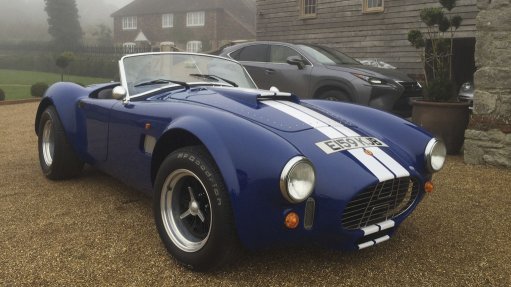
The Hayden Cobra
Automotive Investment Holdings (AIH) has partnered with Les Hayden to industrialise Hayden Cobra kit car production in South Africa.
Hayden started Cobra replica sports car production in South Africa in the 1980s with the Shamrock Cobra. He produced around 500 kits for the local and export markets.
Hayden then licensed a Johannesburg company to also manufacture his design, which evolved into a version that is still being made today.
He continued, however, to improve his design, working closely with a local university engineering department to improve the vehicle’s chassis stiffness, high-speed handling and road-holding. These improvements led to the production of the Hayden Cobra.
It is this Hayden Cobra that will now be produced in a Cape Town factory, by AIH subsidiary Dart Engineering.
“The Cobra will be produced by a new-look company with new investors, and with a targeted focus on quality and industrialisation,” says AIH MD Corrie Kotze.
“We did a market study, which included local and export markets, and we believe there is space for a product with certainty of parts supply and standardisation of parts quality, with parts made to suit this product specifically.
“We’ll produce the Hayden Cobra on a production line, and essentially operate the brand as a small original equipment manufacturer. We intend to make a quantum leap in evolving the business from a hobby to a manufacturing operation.
“Our study show that there is a market for South African-made Cobras in the US, the UK, Middle East, Asia and Australia. We have already signed up agents in the Middle East and will be appointing carefully selected agents in each country.”
Dart Engineering plans to start production with four cars a month, as from January, 2018.
“We are currently in the preproduction master phase, ramping up to steady production,” says Kotze.
South African customers can, however, already order their Hayden Cobras from September.
Kotze declines quantifying AIH’s investment in the venture. AIH owns 90% of the business venture, and Hayden the remaining 10%.
It is expected that the plant may employ around 20 people directly, with additional job creation possible at the various component suppliers, says Dart Engineering MD Ian Smith.
A kit car is a vehicle that is supplied without engine, gearbox and exhaust system. It is up to customers to fit whichever engine they prefer.
Dart Engineering will offer this so-called “kit-minus”, referred to as the Classic 427, as well as the Evo 427 model, which features a more complex multitube chassis, electric wind-up side windows and air conditioning.
Both versions offer a low seating position in order to accommodate taller drivers, as well as a more raked-back windscreen, which improve aesthetics and cockpit wind turbulence, says Smith.
“The Hayden Cobra is an outstanding example of how modern design technology and materials can be applied to one of the most iconic sports-racing cars ever produced,” he adds.
“Every part of the chassis and suspension was subjected to critical finite element method stress analysis in order to arrive at optimum stiffness and strength-to-weight ratios.
“The result of this is a classic sports car that has the feel and road-holding qualities of a modern car, which greatly improves the driving experience.”
The Hayden Cobra also uses vinyl ester resin for the body, which provides a more stable product and freedom from heat distortion that plagues so many of the cars made of the cheaper general purpose polyester resins, says Smith.
Extensive use is made of stainless steel for components such as the fuel tank, bumpers and roll bars, he adds.
“This is, however, dependent on the type of car the customer wants,” says Smith.